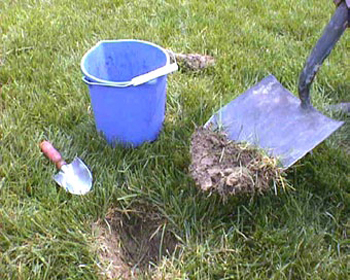How to Collect Soil Samples and Avoid Fees: A Guide for North Carolina Residents
go.ncsu.edu/readext?1033452
en Español / em Português
El inglés es el idioma de control de esta página. En la medida en que haya algún conflicto entre la traducción al inglés y la traducción, el inglés prevalece.
Al hacer clic en el enlace de traducción se activa un servicio de traducción gratuito para convertir la página al español. Al igual que con cualquier traducción por Internet, la conversión no es sensible al contexto y puede que no traduzca el texto en su significado original. NC State Extension no garantiza la exactitud del texto traducido. Por favor, tenga en cuenta que algunas aplicaciones y/o servicios pueden no funcionar como se espera cuando se traducen.
Português
Inglês é o idioma de controle desta página. Na medida que haja algum conflito entre o texto original em Inglês e a tradução, o Inglês prevalece.
Ao clicar no link de tradução, um serviço gratuito de tradução será ativado para converter a página para o Português. Como em qualquer tradução pela internet, a conversão não é sensivel ao contexto e pode não ocorrer a tradução para o significado orginal. O serviço de Extensão da Carolina do Norte (NC State Extension) não garante a exatidão do texto traduzido. Por favor, observe que algumas funções ou serviços podem não funcionar como esperado após a tradução.
English
English is the controlling language of this page. To the extent there is any conflict between the English text and the translation, English controls.
Clicking on the translation link activates a free translation service to convert the page to Spanish. As with any Internet translation, the conversion is not context-sensitive and may not translate the text to its original meaning. NC State Extension does not guarantee the accuracy of the translated text. Please note that some applications and/or services may not function as expected when translated.
Collapse ▲For farmers, gardeners, and homeowners in North Carolina, soil testing is a vital step in achieving optimal plant health and productivity. Regular soil tests help determine the nutrient needs of your soil and provide personalized recommendations for fertilization. The North Carolina Department of Agriculture and Consumer Services (NCDA&CS), in partnership with NC State Extension, offers soil testing services to residents at little to no cost—depending on the time of year. Here’s a step-by-step guide on how to collect soil samples and tips on how to avoid soil sample fees.
Step-by-Step Guide to Collecting Soil Samples
- Gather Tools
You will need a clean plastic bucket, a trowel or soil probe, and soil sample boxes or bags (available for free from your local NC State Extension office or NCDA&CS). Ensure the tools are free of any fertilizer or pesticide residue to avoid contamination. - Identify Sampling Areas
Divide your property into distinct areas based on different uses or crop types. For instance, sample your lawn, vegetable garden, flower beds, and pastures separately. Each area should have a sample of its own. - Take Soil Samples
Using the trowel or probe, collect soil from 6 inches deep for garden beds or 4 inches deep for lawns. Take 5-10 samples from random spots within each identified area and place them in your bucket. Mix these samples thoroughly to create a composite sample. Avoid areas that are close to driveways, buildings, or areas with recently applied fertilizer or lime. - Prepare the Sample for Submission
Once the composite sample is thoroughly mixed, place approximately 1 pint of soil into the soil sample box or bag. Be sure to fill out the necessary information on the form provided by NCDA&CS, including crop code and intended use, which will help tailor the recommendations. - Submit Your Sample
Drop off the samples at your local NC State Extension office or ship them directly to the Agronomic Division of NCDA&CS in Raleigh. Your results will typically be available online within a few weeks.
How to Avoid Soil Sample Fees
While soil testing is free most of the year, a peak-season fee of $4 per sample is charged between December 1st and March 31st. To avoid paying this fee, it is best to submit your samples before December 1st to the NCDA&CS. If you are submitting to the Sampson County Extension Office, the deadline for submissions is November 26 at noon.
Soil testing outside of the peak season ensures you get valuable insights into your soil’s health at no cost, making it a smart and affordable investment for both residential and agricultural land management. For more detailed information or assistance with soil sampling, contact your local NC State Extension office or visit the NCDA&CS website.




